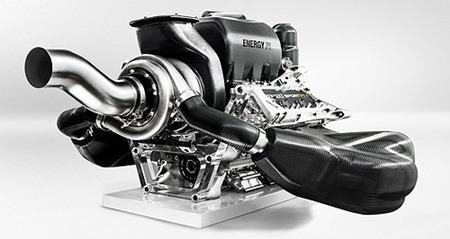The recent advances in Formula 1 technology is to extend Renault hybrid and EV range to the road going vehicles.
The new for 2014 F1 V6 engines such as the Renault Sport F1 which develops 567 kW/500 Nm from the 1.6 liter V6 turbo engine captures energy from the waste exhaust gasses and turns it into electricity to drive a hybrid power system.
A turbocharger is also connected to a dual-purpose electric motor which converts up to 40 percent of the waste energy into power.
However, this system which combines a turbo with an electric-motor/generator will also filter down to road cars, predicts Renault Sport F1 head of track operations Remi Taffin.
 Renault Sport F1 engine
Renault Sport F1 engine
“We get something like 100 kW from the engine just from the exhaust gas. That’s the part we would like to see on road cars,” he said.
“We have 30 or 40 people at Renault Sport who developed our engine because direct injection and turbo-charging is all used in road car technology,” said Remi Taffin.
The return to turbo-charged engines in Formula 1 has seen a dramatic cut of up to 40 percent in fuel consumption, but with only a minor loss of power over last year’s normally aspirated V8 engines and Remi Taffin believes it is just the start of advances in both race and road car technology.
“There is one area that has not been explored and where Formula 1 is going to get the most out of for lap times – energy recovery systems. If you look at the extra systems and the electric motors… that is where we are going to get the extra performance. That’s what we are focusing on.”
This engine technology may be fine for the F1 circus, but I believe there is (currently) not so much of an application to road vehicles. Performance is a factor, and so is a decrease in fuel consumption, but at what cost to the end user? If the technology costs more than it saves in running costs, it will be very difficult to sell this concept to the ordinary motorist.




